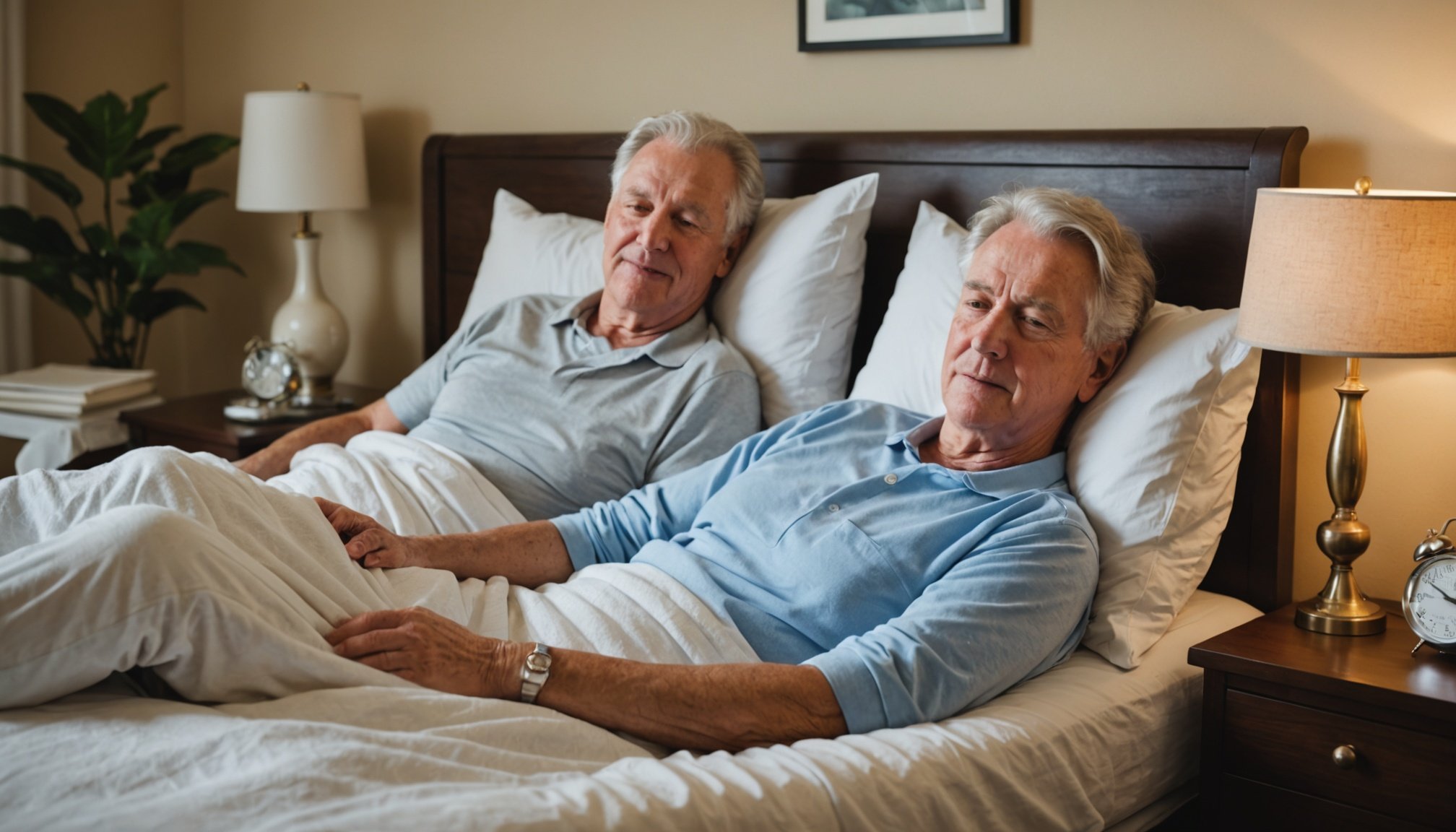Transforming Sleep Spaces: Essential Tips for Seniors to Enhance Sleep Hygiene at Home
Creating a Conducive Sleep Environment
When it comes to enhancing sleep hygiene, the environment in which you sleep plays a crucial role, especially for seniors. A well-designed sleep space can significantly impact the quality of your sleep, mental health, and overall well-being.
Lighting and Temperature
To create an ideal sleep environment, it’s essential to pay attention to lighting and temperature. “Light exposure is a powerful regulator of our circadian rhythms,” notes Adrienne Santos-Longhurst, a health and lifestyle writer. Reducing blue light exposure, especially in the hours leading up to bedtime, is vital. This can be achieved by using room-darkening curtains, swapping out nightlights for red bulbs, or avoiding screen time 2 to 3 hours before bed[3].
In the same genre : Essential Tips for Seniors to Track Blood Pressure from the Comfort of Home
Maintaining a comfortable temperature in the bedroom is also crucial. A cooler room can promote better sleep, so keeping the temperature between 60°F and 67°F (15.5°C and 19.4°C) is recommended. This can help regulate your body’s natural sleep cycles and improve the quality of your night sleep[4].
Bedding and Mattress
Investing in high-quality bedding and a comfortable mattress is another key aspect of creating a conducive sleep environment. “High-quality sheets and supportive pillows can make a big difference in both comfort and appearance,” suggests an article on bedding essentials. For seniors, it’s important to choose pillows that provide the right level of support for their preferred sleeping position. For example, back sleepers might prefer medium-firm pillows, while side sleepers often need thicker, firmer options to align the neck properly[5].
In parallel : Discover Safe and Effective Water Workouts for Seniors: A Guide to Rejuvenating Aquatic Exercises
When it comes to mattresses, older adults may benefit from mattresses that address specific sleep problems such as sleep apnea, chronic pain, or menopause-related discomfort. Adjustable mattresses that can elevate the head and back can help with sleep apnea and snoring, while mattresses designed for back pain can provide the necessary support and comfort[4].
Practical Tips for Better Sleep Hygiene
Adopting good sleep hygiene practices is essential for improving sleep quality, especially as people age. Here are some practical tips to help seniors enhance their sleep hygiene:
Establish a Regular Sleep Schedule
Going to bed and waking up at the same time every day helps regulate your body’s natural sleep cycles. “Keeping a regular sleep schedule reinforces your body’s natural sleep cycles,” advises Vafiadis from the National Council on Aging (NCOA)[4].
Reserve the Bedroom for Sleep
The bedroom should be a sanctuary for sleep. Avoid using the bedroom for activities like watching TV, working, or eating. This helps your brain associate the bedroom with sleep, making it easier to fall asleep and stay asleep.
Avoid Stimulating Activities Before Bedtime
Activities like exercise, while beneficial for overall health, should be avoided close to bedtime as they can stimulate the body and make it harder to fall asleep. Similarly, consuming caffeine, alcohol, or heavy meals close to bedtime can disrupt sleep patterns. Here are some specific things to avoid:
- Caffeine: Stop coffee intake 8-9 hours before bedtime.
- Alcohol: While it may help you fall asleep, it won’t keep you asleep.
- Exercise: Avoid exercising too close to bedtime.
- Food and Drinks: Limit eating or drinking before bedtime to avoid nocturnal heartburn and reflux[3][4].
Develop an Evening Routine
Engaging in a quiet, soothing activity before bed can help your body and mind wind down. This could include taking a bath, writing in a journal, or listening to relaxing music. Such routines signal to your body that it’s time to sleep.
Home Modifications for Safety and Accessibility
Creating a safe and accessible home environment is crucial for seniors to ensure they can move around comfortably and safely, which in turn can improve their sleep quality.
Accessibility Upgrades
Installing ramps, stairlifts, and handrails can make it easier for seniors to navigate different levels of the house. These modifications provide stability and reduce the risk of falls or accidents, which can be particularly beneficial for those with mobility issues[2].
Bathroom Modifications
The bathroom is a high-risk area for accidents. Implementing modifications such as walk-in tubs, grab bars, and raised toilets can significantly improve safety and comfort. Walk-in tubs, for instance, offer a safe and convenient way to bathe, with features like handrails and non-slip surfaces reducing the risk of slips and falls[2].
Kitchen Adaptations
The kitchen is another area where modifications can enhance accessibility and safety. Lowered countertops, pull-out shelves, and easy-to-reach appliances can make it easier for seniors to engage in cooking and meal preparation without straining themselves[2].
Decluttering and Organizing for Peace of Mind
A clutter-free home can contribute significantly to a peaceful and restful sleep environment. Here are some tips on how to declutter and organize your space effectively:
Start Small
Decluttering an entire home at once can be overwhelming. Start by focusing on one area or room at a time. Breaking the process into manageable steps makes it less daunting and more achievable[1].
Keep Only What You Love or Need
Adopt the “love it or need it” rule when deciding whether to keep or part with an item. This helps in creating a space filled with positivity and purpose. By keeping only what brings you joy or serves a purpose, you make space for meaningful moments and reduce stress[1].
Digitize Memories
For many seniors, letting go of sentimental items is challenging. Consider digitizing memories by scanning old photographs or letters and storing them in a digital format. This allows you to preserve the memories without holding on to physical clutter[1].
Managing Stress and Mental Health
Stress and mental health issues can significantly impact sleep quality. Here are some strategies to help manage stress and improve mental health:
Practice Mindfulness
Mindfulness practices such as meditation or deep breathing can calm racing thoughts, slow your heart rate, relax tensed-up muscles, and create a sense of well-being. These practices can help reduce anxiety and stress, making it easier to fall asleep and stay asleep[4].
Stay Socially Connected
Reducing loneliness can improve sleep quality. Engaging in social activities, volunteering, or attending community events can help seniors stay connected and reduce feelings of isolation[4].
Healthy Diet and Exercise
Following a healthy diet and engaging in regular physical activity can help prevent chronic diseases and improve overall health. Exercise can lower blood pressure, reduce anxiety, ease pain, and boost mood, all of which can contribute to better sleep[4].
Transforming your sleep space into a conducive and safe environment is a multifaceted process that involves various aspects, from lighting and temperature to home modifications and stress management. By implementing these practical tips, seniors can significantly enhance their sleep hygiene, leading to better sleep quality, improved mental health, and a more fulfilling life.
Here is a summary of the key points in a detailed bullet point list:
- Establish a Regular Sleep Schedule: Go to bed and wake up at the same time every day.
- Reserve the Bedroom for Sleep: Avoid using the bedroom for activities other than sleep.
- Avoid Stimulating Activities Before Bedtime: Avoid caffeine, alcohol, exercise, and heavy meals close to bedtime.
- Develop an Evening Routine: Engage in quiet, soothing activities before bed.
- Install Safety Modifications: Use ramps, stairlifts, handrails, walk-in tubs, and other safety features.
- Declutter and Organize: Start small, keep only what you love or need, and digitize memories.
- Manage Stress and Mental Health: Practice mindfulness, stay socially connected, follow a healthy diet, and engage in regular exercise.
By following these tips, seniors can create a sleep environment that promotes good sleep hygiene, ensuring a restful night’s sleep and better overall health.











